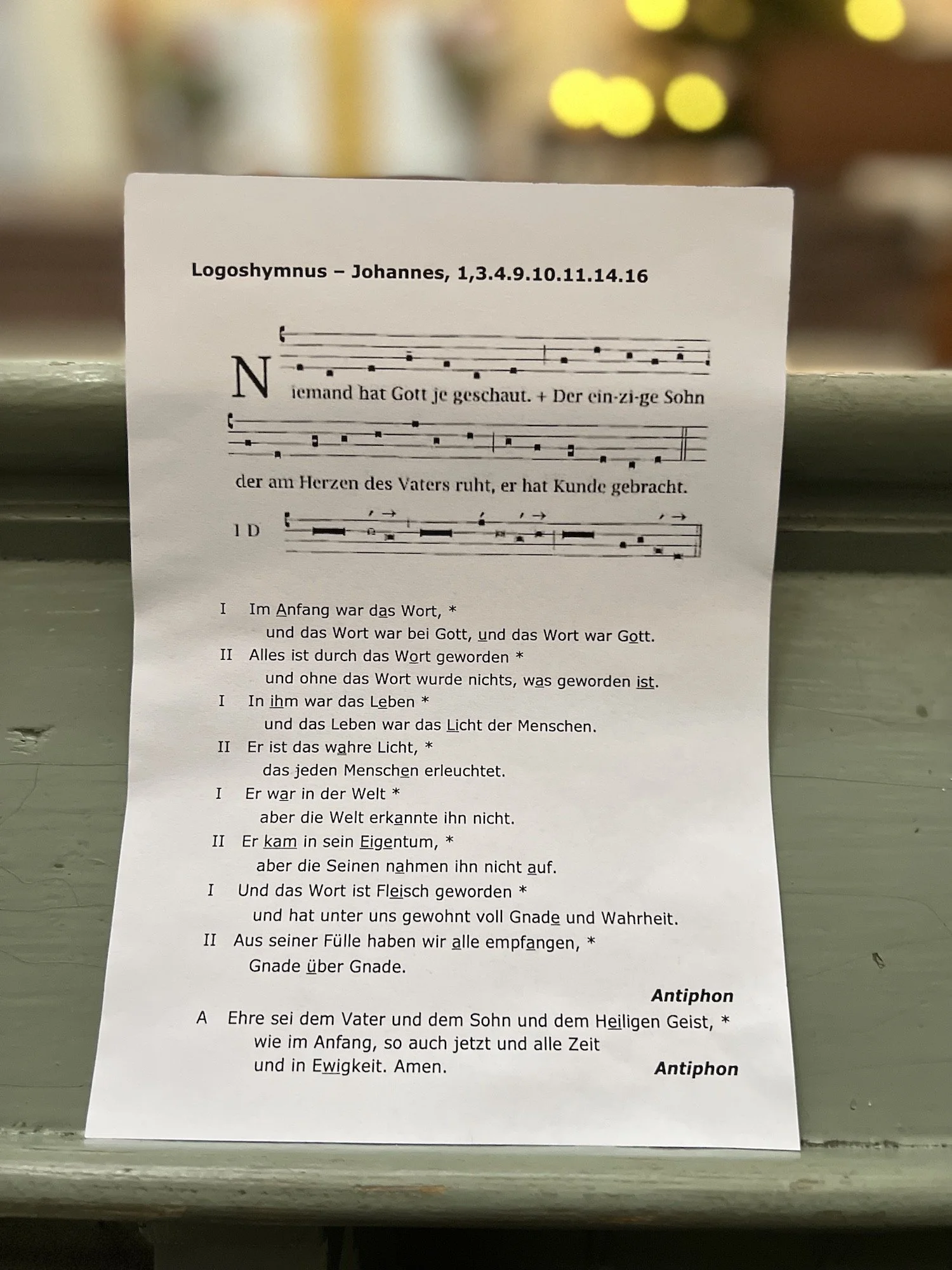Dear friends and fellow travelers,
We welcome you on this 12th day of Christmas which marks in the liturgical year also the eve of Epiphany. We finally settled back into our monastic schedule here in Berlin, Germany after much traveling and family visits, much more than in previous years.
I made a photo for you from today’s noon prayer liturgy. It was built around my favorite Christmas text: John 1:
In the beginning
was the word,
and the word was
with God
and God
was the word …
…
And the word
became flesh
and lived
among us…
What a powerful, mythical and mystical text. Yes, there is the story of Mary and Joseph and the little baby child. And it moves even the most guarded heart, when the lights go out and “Silent night” is sung.
But, the word which becomes flesh, the eternal word living among us, is the Christmas meditation I most cherish. It opens up the mystery of incarnation so vividly and forcefully and poetically all at once.
Martin Buber, the Jewish philosopher of religion and also the medieval philosopher Hildegard of Bingen have both cherished this text highly. And indeed, I think it is the most philosophical text in the Bible. And here I mean philosophical in its original meaning, namely as the love of wisdom.
The living word, as Martin Buber has it, is seeking a dwelling place in us. It is not the word in books, it is not the intellectual puzzle, it is the word which matters to us in the depth of our souls. It is the word which transforms our souls.
There is a lovely tradition to find one’s word for the new year. And what you truly find is a word which matters to your heart, something which resonates with your whole being, which gives you meaning and a home to return to.
One of Hildegard’s most important words is the Latin “rationalitas”, Divine knowledge. For her, rationalitas is a multifaceted aspect of the Divine, and goes far beyond rationality, a term our enlightened time has so reduced to simple calculating, which has not much in common with the living word.
The rationalitas of the living word desires to dwell in us, longs to live in us, wants to lead us to wisdom. There is no way really to teach wisdom. Because wisdom is what you, dear fellow pilgrim, do with what you learn. It is a way of being that we can learn from Mary, who “pondered all these words” (from the shepherds and wise men) “in her heart.”
This is how wisdom comes about. When a word falls into our heart and becomes alive in there.
Martin Buber created his entire philosophy of dialogue around this understanding of wisdom. Being in dialogue is to get away from a mere objective stance, our calculating, objectifying of all and everything, it is to get into a stance which sees the other as a “Thou,” as a whole creature, someone we are drawn to dialogue with, in the same way that the Divine longs to dialogue with us. No wonder that the eternal Thou was so important to Buber.
And in many ways, though Buber was no Christian, his vision of intimate, Divine, dialogue brings the Christmas story alive for me.
In the beginning was the word. And it became flesh. That is, the eternal word becomes an intimate dialogue partner, a lover. This Divine reaching out to us begins the process of walking pregnant with and birthing the holy into our own life.
And so, at the end of our journey, I always come back to it. I cannot help it. I always arrive there, year and again. The word incarnate is the central mystery of Christmas and it does not care much about Dec 25.
It incarnates always again, every day, when enemies listen to each other, when lovers awake their love again, when barren thorns give rise to roses again, and when peace dwells in our hearts.
And so today, on this last day of our journey we invite you to meditate on the word incarnate, become flesh, God-with-us. May its presence dwell in you to bring you peace.
Almut with Chuck and little one
PS: We will be back tomorrow one more time with a farewell blessing (helped by the St Olaf choir)
Practice
Here is a free translation of the logos hymn for you to meditate on. You might want to read it slowly to yourself or even chant it.
In the beginning was the word
and the word was with God and God was the word.
All came into being through the word and there is nothing which became without the word.
In the word was the life
and this life was the light of the people.
This word is the true light
which enlightens every human.
The word came into the world
but the world did not realize it.
The word came home
but its people did not welcome it.
And the word became flesh
and lived among us
full of grace and truth.
From its fullness we received
grace beyond grace.
…



